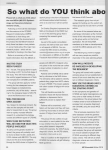I have been busy all day with other work and have not therefore had time till now to read through some the large number of postings that have been made on all the different topics on this thread since late last night
So I have written a few quick points relating to questions and complaints that concern me on the postings that I have looked at so far today
Apologies for not answering every question and complaint - I just don't have the time to do so tonight!
IS THERE AN ME RESEARCH GROUP?
There is a clinical and research study group that relates to Ramsay or London described/defined ME: The Melvin Ramsay Society
Our membership includes (or did include) a number of very notable doctors who were all interested in or involved in research into Ramsay or London described/defined ME
Membership includes/included Dr Melvin Ramsay, Dr Betty Dowsett, Professors Peter and Mina Behan, Professor John Gow, Dr Abhijit Chaudhuru,Profesor Ted Dinan, Dr Gordon Parish, Dr John Dadswell, Dr Nigel Speight, Dr William Weir, Profesor Derek Pheby...
Unfortunately, new doctors have not come forward with the same interest or enthusiasm for researching ME as a distinct clinical entity and a significant proportion of the MRS membership has either retired or sadly died over the past ten years
So the MRS is no longer an active research organisation
As one of the few MRS committee members still working, I would be happy to try and get things moving again - but I do need active support and practical help if this is going to be achieved
My voluntary workload is already more than I can comfortably cope with and I just cannot add reviving the MRS to this without meaningful practical help and support from my medical colleagues
The MRS does not have a website but here is a link to one of our meetings:
http://www.meassociation.org.uk/2007/04/melvin-ramsay-society-meeting-friday-20-april-2007/
MEA WEBSITE DIRECTORY OF NHS SERVICES
We have listened to what people are saying and I have been working on the inclusion of some information about CBT, GET and Pacing at the start of this Directory with Tony this morning
When Tony is next on the site there will be an additional item of background information covering CBT, GET and Pacing
MEA directory of UK clinics and services for ME/CFS:
http://www.meassociation.org.uk/spe...uk-this-page-last-updated-on-27-october-2016/
CMRC AND MRC
The MRC obviously has a close and very supportive role in relation to the work of the CMRC and the research conferences that we now hold each year - mainly due to the fact that the CMRC basically too over from the MRC Expert GRoup on ME/CFS Research
On the whole I think this relationship is fairly clear and open - including the fact that we hold CMRC meetings at the MRC, a member of the MRC neuroscience staff who deals with ME/CFS research attends as an observer, and the MRC provides some financial support to the CMRC conference.
This information is all there in the public domain and I would far prefer to see the MRC working closely with any group or groups of the ME/CFS research community than not having any regular contact at all
But if anyone has any concerns about possible conflicts of interest between the CMRC and MRC, either on an individual basis, or the two groups as a whole, then I would encourage them to raise their concerns with the MRC - so that a clear answer can be provided and placed in the public domain
When I was a member of the MRC Expert Group on ME/CFS Research we all had to declare any conflicts of interest and this information was published on the MRC website
I think the Board of the CMRC should do the same and I will raise this with the Board when we next meet
I would also be very happy to declare any taxable earnings and fees relating to work that I do in relation to ME/CFS as part of such a process - if this was thought to be helpful in making our positions clear
MRC website section on ME/CFS, including work of the Expert Group on ME/CFS Research and conflicts of interest:
http://www.mrc.ac.uk/funding/science-areas/population-systems-medicine/cfsme/
MRC highlight notice relating to immune system dysregulation, pain and neuropathology of ME/CFS:
https://www.mrc.ac.uk/funding/how-we-fund-research/highlight-notices/cfs-me-highlight-notice/
Brief background notes from the MEA on the CMRC:
http://www.meassociation.org.uk/research2015/cfsme-research-collaborative/
MEGA STUDY
As I've been stating on numerous occasions, the detailed planning of the MEGA study, along with the protocol that will be submitted for funding in 2017, is still being discussed - so a whole range of decisions relating to patient selection and assessment, which are obviously of major concern to both the ME patient community and the MEA, are not yet anywhere near being finalised
Details of the advisory group and a new MEGA website will be announced shortly
I wwant to continue to play a constructive role in this development process as a charity representative - this will be critical and questioning where necessary
I am not part of the MEGA planning group - so my views are purely advisory
Once the protocol has been decided by the MEGA planning group, MEA trustees will decide whether this meets all their concerns and questions relating to patient assessment, patient selection, and the inclusion of distinct cohorts such as those with severe ME/CFS, and use of the ME Biobank samples
If we believe it does then we will support the MEGA study moving forward
If we are not happy with what is being proposed we will not provide any further support to the MEGA bid
As people have noted, the November issue of ME Essential ( which members should now have) contains an Editorial by Neil Riley (or Chairman) on MEGA and a summary of what was known about the study design when the copy was being prepared - this was about 2 weeks ago
We are asking for membership feedback on what is known so far and we will be consulting our members again in February when there should be more infromation available about patient assesment and selection etc
As to how we ask our members to comment on the final protocol, and whether they want their charity to support the bid for funding, thisd has still to be decided
But some form of membership yes/no vote is clearly one possibity
We welcome the views of our members on this as well
ME BIOBANK FUNDING AND THE NIH GRANT
The ME Biobank is funded by the MEA Ramsay Research Fund and I am Chairman of the ME Biobank Steering Group - so we obviously have a close and supportive working relationship with the Biobank
We are also keen to progress and enlarge this vital new item of ME/CFS research infrastructure here in the UK
To receive a £1 million research grant from the NIH in America was a tremendous endorsement of the quality of the work (and the blood samples) that has been done so far and preliminary discussions have been taking place with research funding organisations, including government research pots, regarding sources of funding that will help to secure the long term future of the Biobank
I will go so far as to say that we have not been successful with one (non governmental) approach where we felt there was a reasonable chance of success
But I hope people will appreciate that I cannot go into more detail on a public forum about other options that are being considered
ME Biobank website:
http://cureme.lshtm.ac.uk
ME biobank opens for business - May 2016:
http://www.meassociation.org.uk/2016/05/uk-mecfs-biobank-opens-for-business-13-may-2016/
NIH grant to ME Biobank:
http://blogs.lshtm.ac.uk/news/2013/06/28/uk-mecfs-biobank-project-awarded-1-million-grant/
Constructive criticism is fine but please note that I am not wililng to respond to emails or postings that are aggressive or rude and it was sad to find that the PR moderators had to step in last night with a warning on another discussion that I was contributing to
Dr Charles Shepherd
Hon Medical Adviser, MEA



